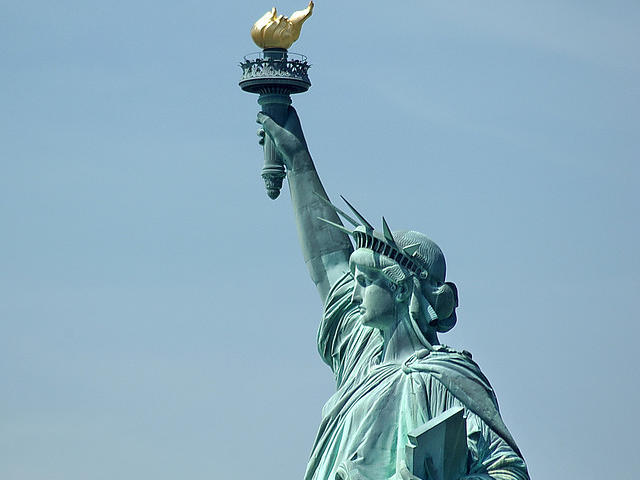
How ‘travel’ and ‘vacation’ are different

My daughter Luci went to New York City last week to celebrate her 12th birthday. I was surprised by how happy this made me. And wondered why.
Some of it had to do with my own feelings about New York, where I lived and worked for five fantastic years. I knew Luci would have a ball, seeing the skyscrapers, eating at top-flight restaurants, and exploring some of the world’s most magnetic attractions, such as the lady above.
But it wasn’t the fun that piqued my excitement; it was the transformation.
And this, for me, is the difference between “vacation” and “travel.” Vacation comes to English from the past participle stem of the Latin vacare, “to be empty, free, or at leisure.” And that emptying out, that letting your drained battery recharge, is done when you rent the condo in Carpinteria for a fortnight, hit the beaches in Maui on a long weekend, or take a two-day swing through Disneyland. Or Vegas.
Travel is related to the word travail and originally meant to toil or labor. It came to us from the Vulgar Latin tripaliare, to torture. To me, travel has always been about life’s real education, about opening one’s eyes, heart, and mind to new ways of seeing. And to enlarging our capacity for awe. Travel is fatal to prejudice, bigotry, and narrow-mindedness. — Mark Twain As is true with classroom lessons, sometimes the change and learning we confront while traveling are difficult, even painful. I remember a midnight trip to the emergency room in Seoul, the blown gasket on a snowy December night in the Bavarian countryside, the lost passport in Switzerland, the police officer who pulled us over in Morocco. Tripaliare indeed. When our body’s wounds heal, they form scars; when our travel wounds heal, they form stories.
Some people think travel is merely the cure for wanderlust; I think it’s the cure for intolerance. “Travel is fatal to prejudice, bigotry, and narrow-mindedness, and many of our people need it sorely on these accounts,” Mark Twain wrote in The Innocents Abroad. “Broad, wholesome, charitable views of men and things cannot be acquired by vegetating in one little corner of the earth all one’s lifetime.” Travel reveals, incessantly and forcefully, our shared humanity.
The Moroccan traveler Ibn Battuta left home on a hajj in 1325 and wound up traveling through most of the Muslim world before returning home. “Traveling,” Ibn Battuta wrote, “it leaves you speechless, then turns you into a storyteller.”
Unlike Ibn Battuta, Luci won’t be gone for 25 years. But she will come back changed. I told her I didn’t want any souvenirs from New York; I wanted stories.